Charles E W Bean, Diaries, AWM38 3DRL 606/2/1 - January - March 1915 - Part 11
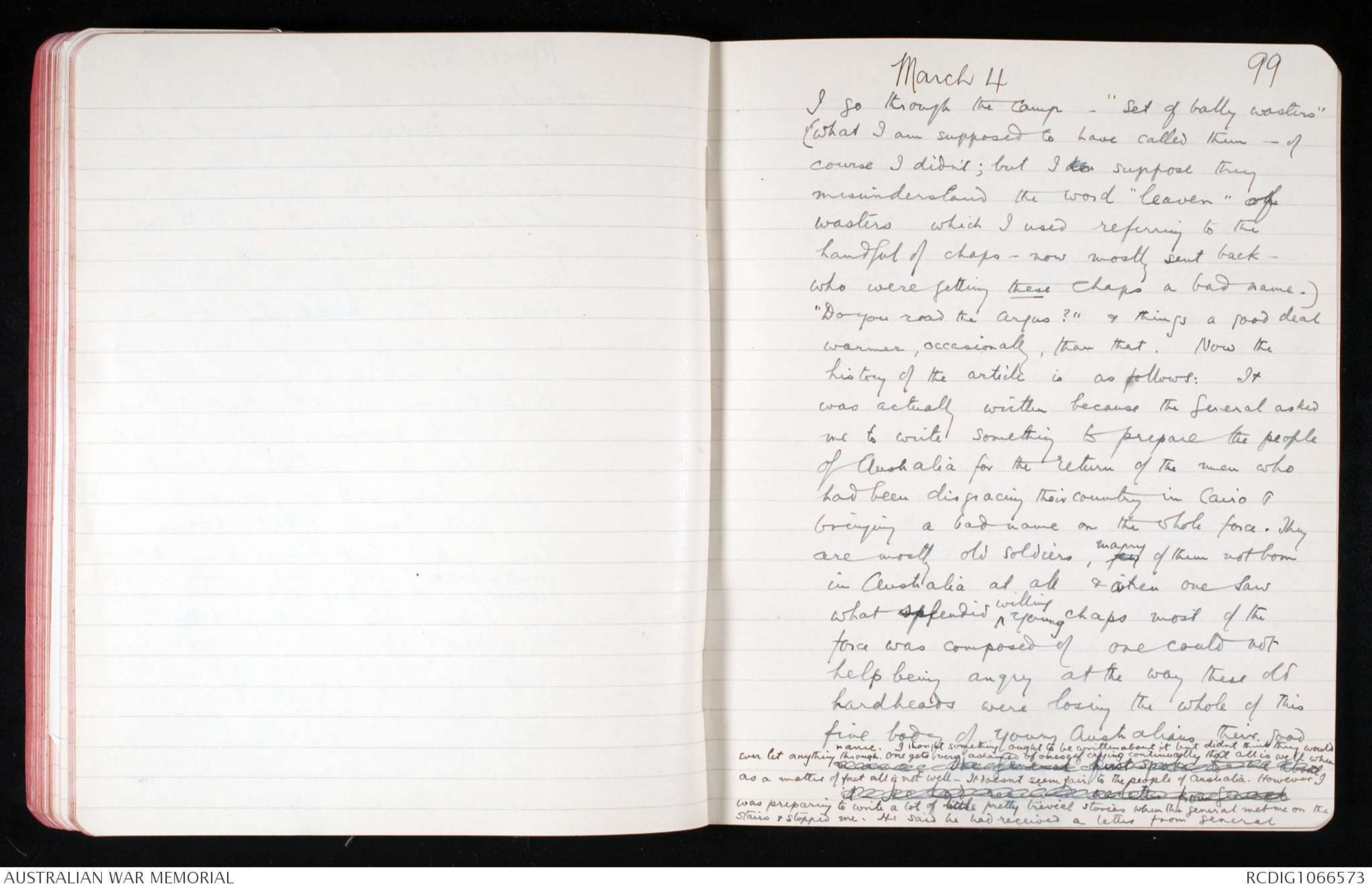
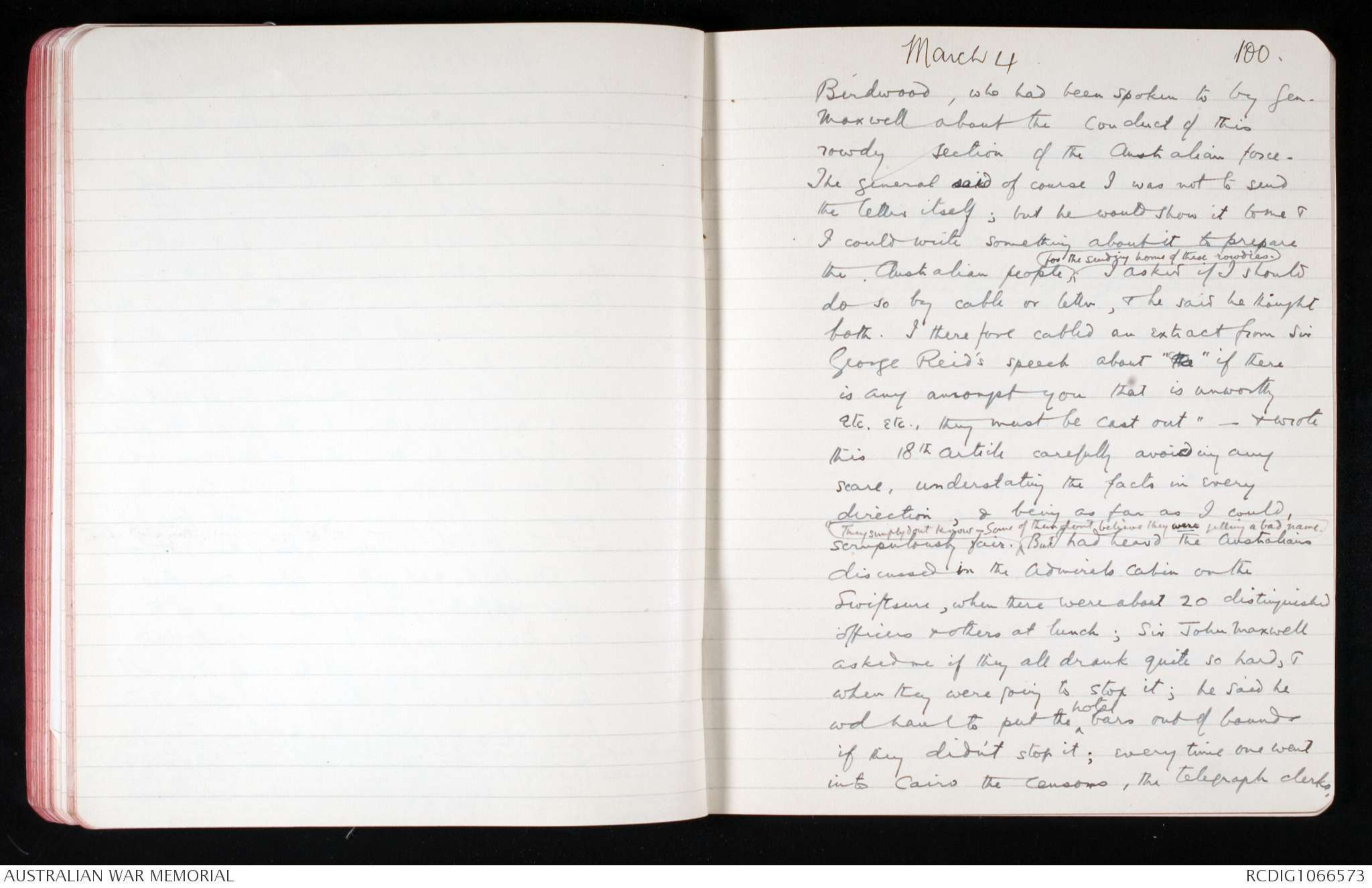
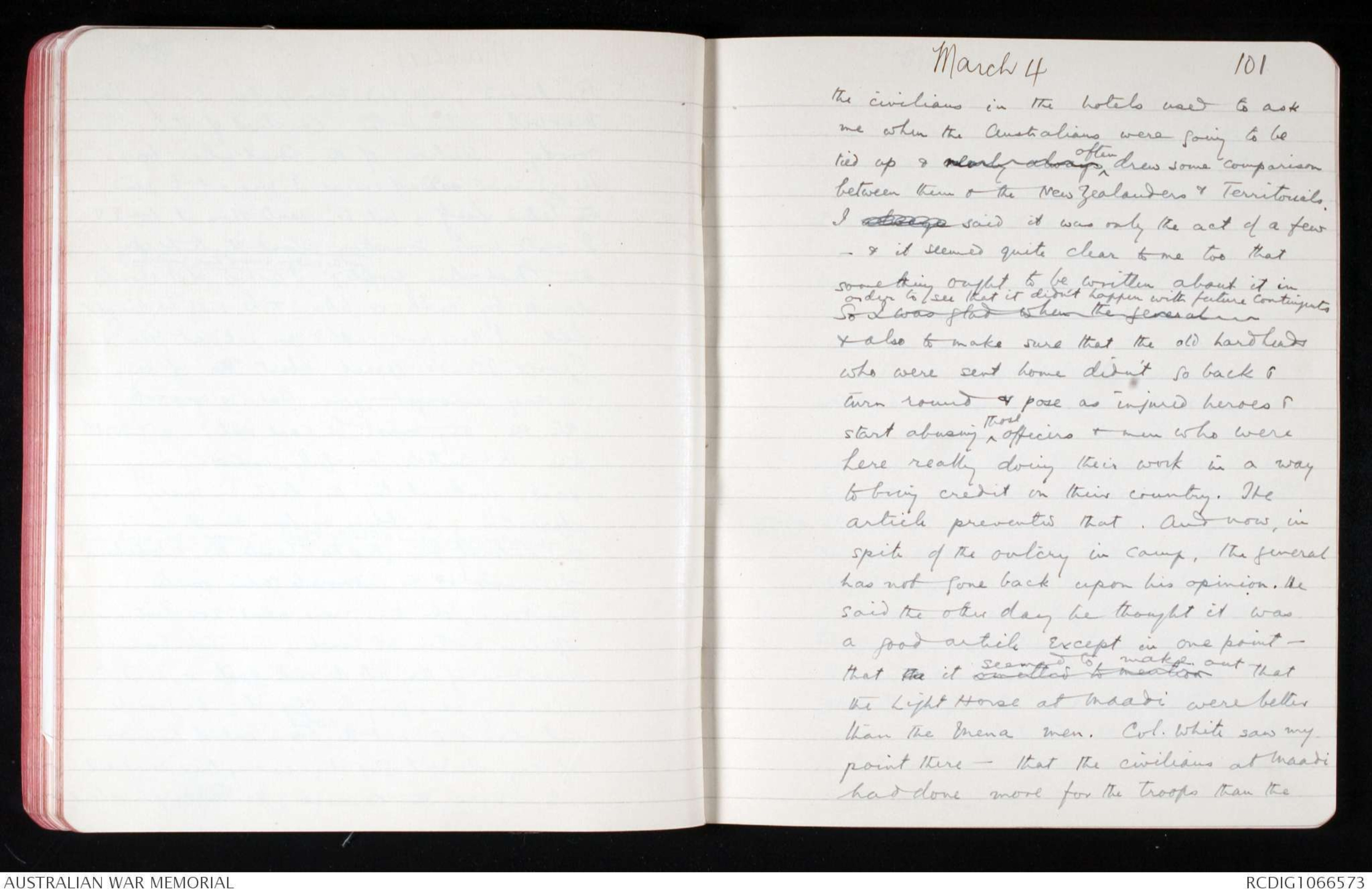
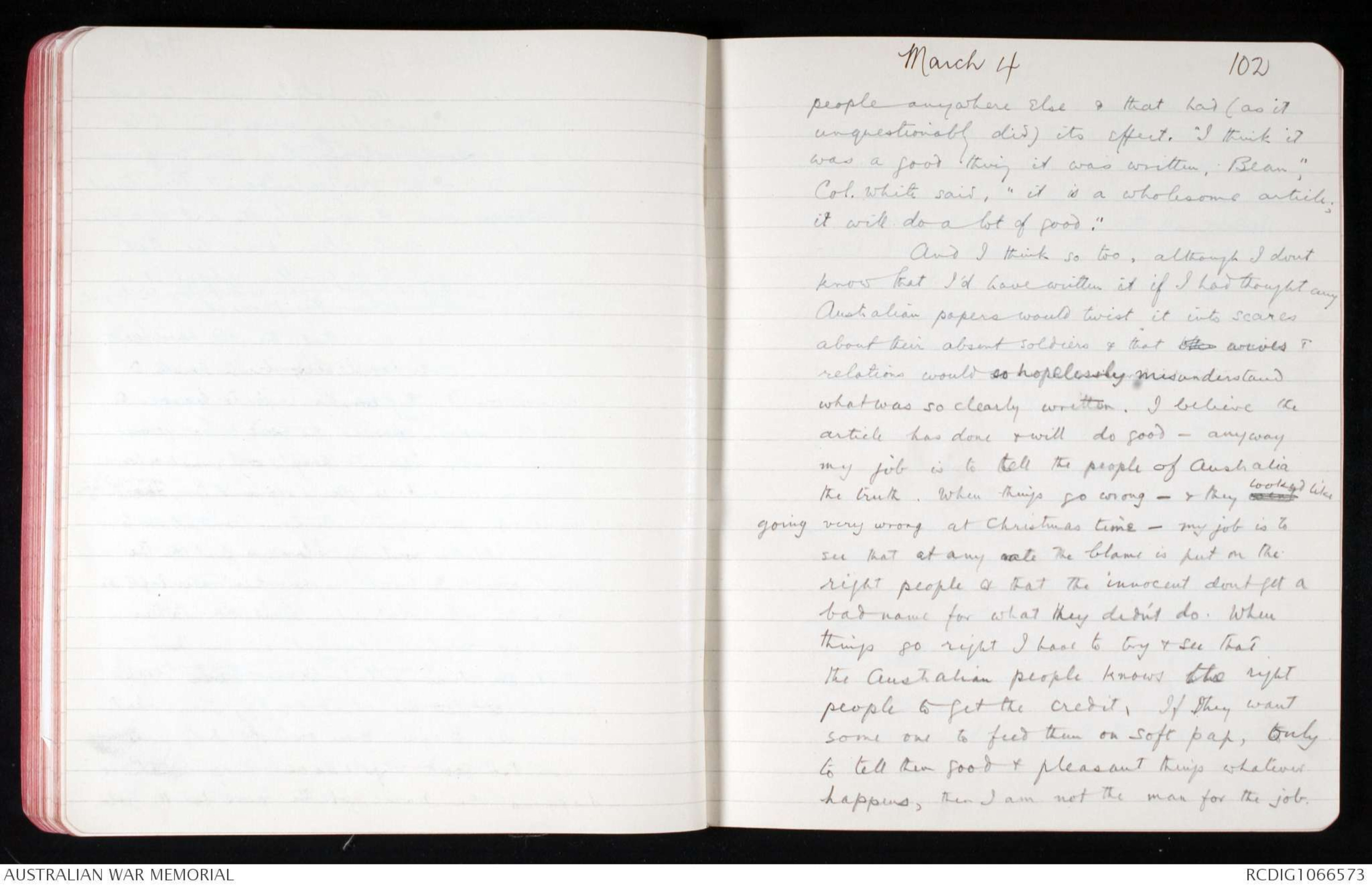
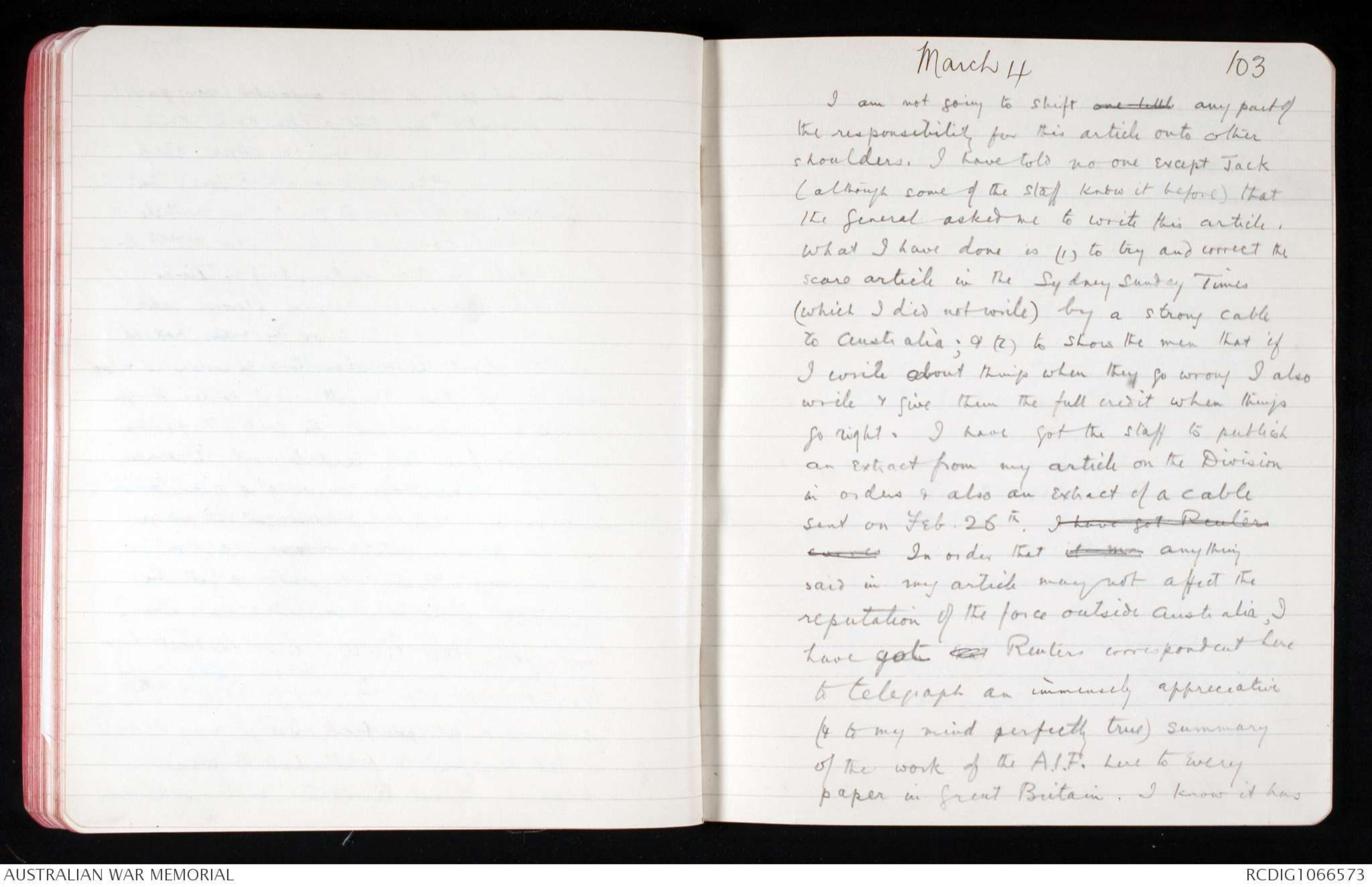
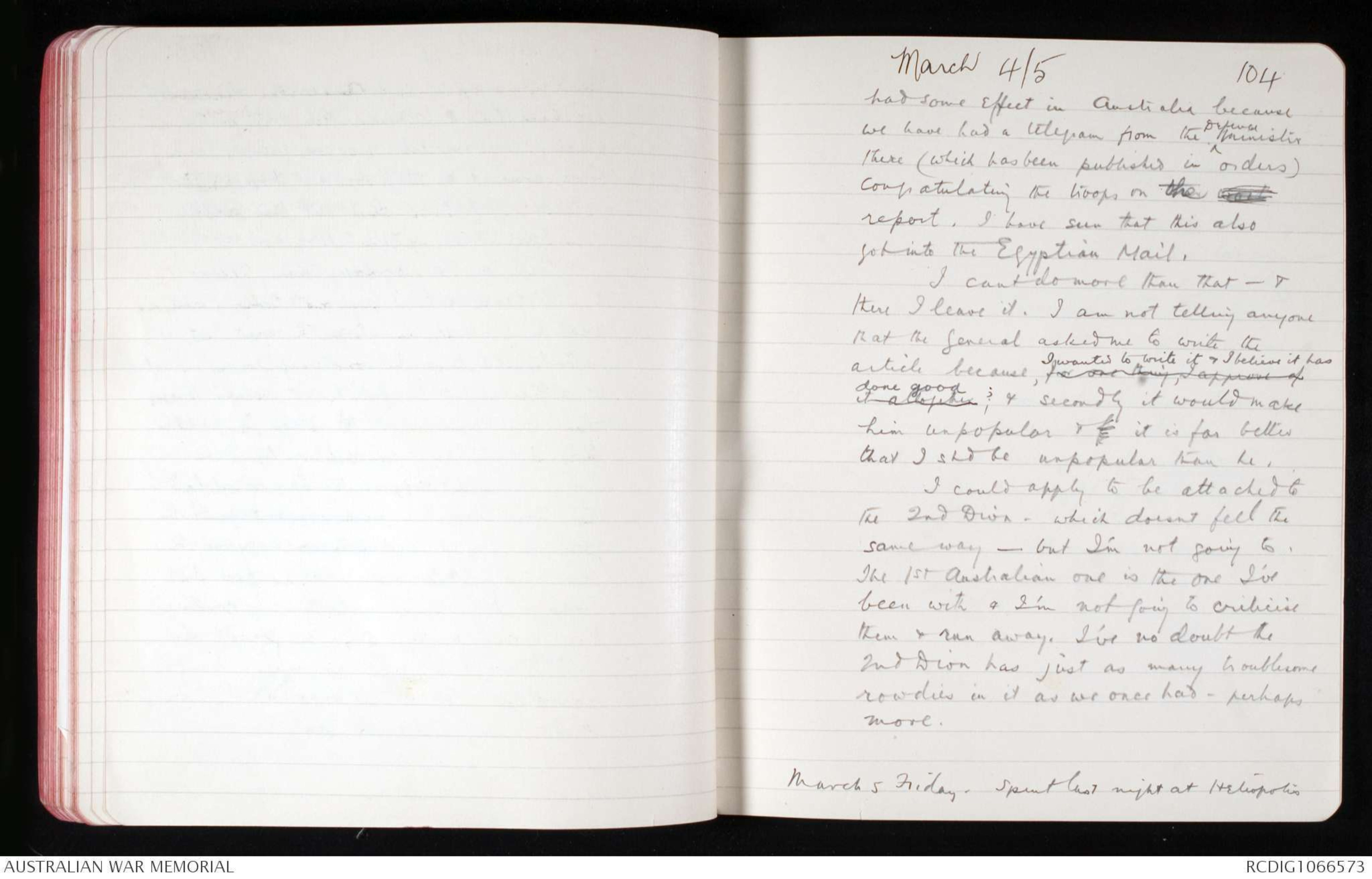
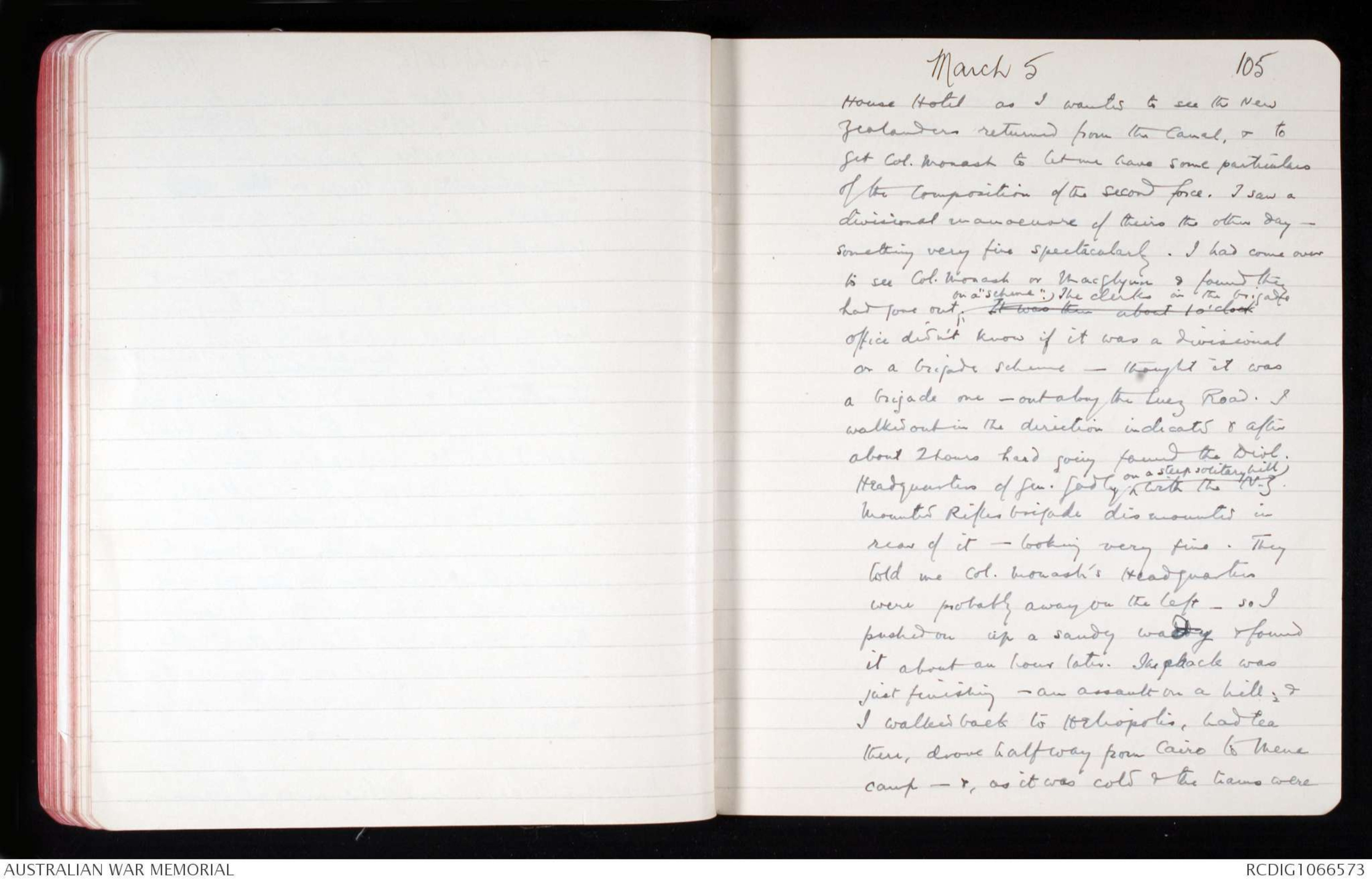
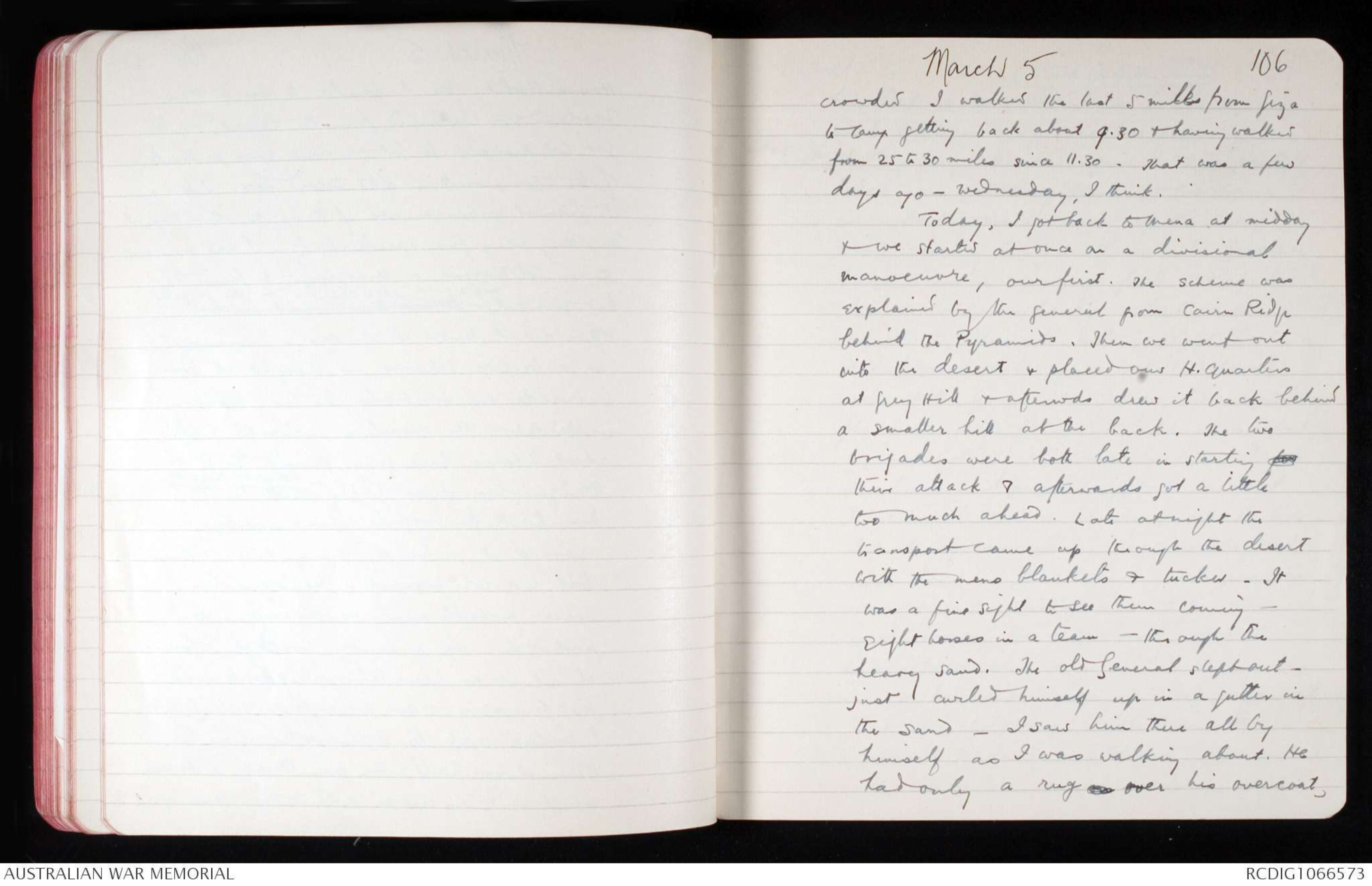
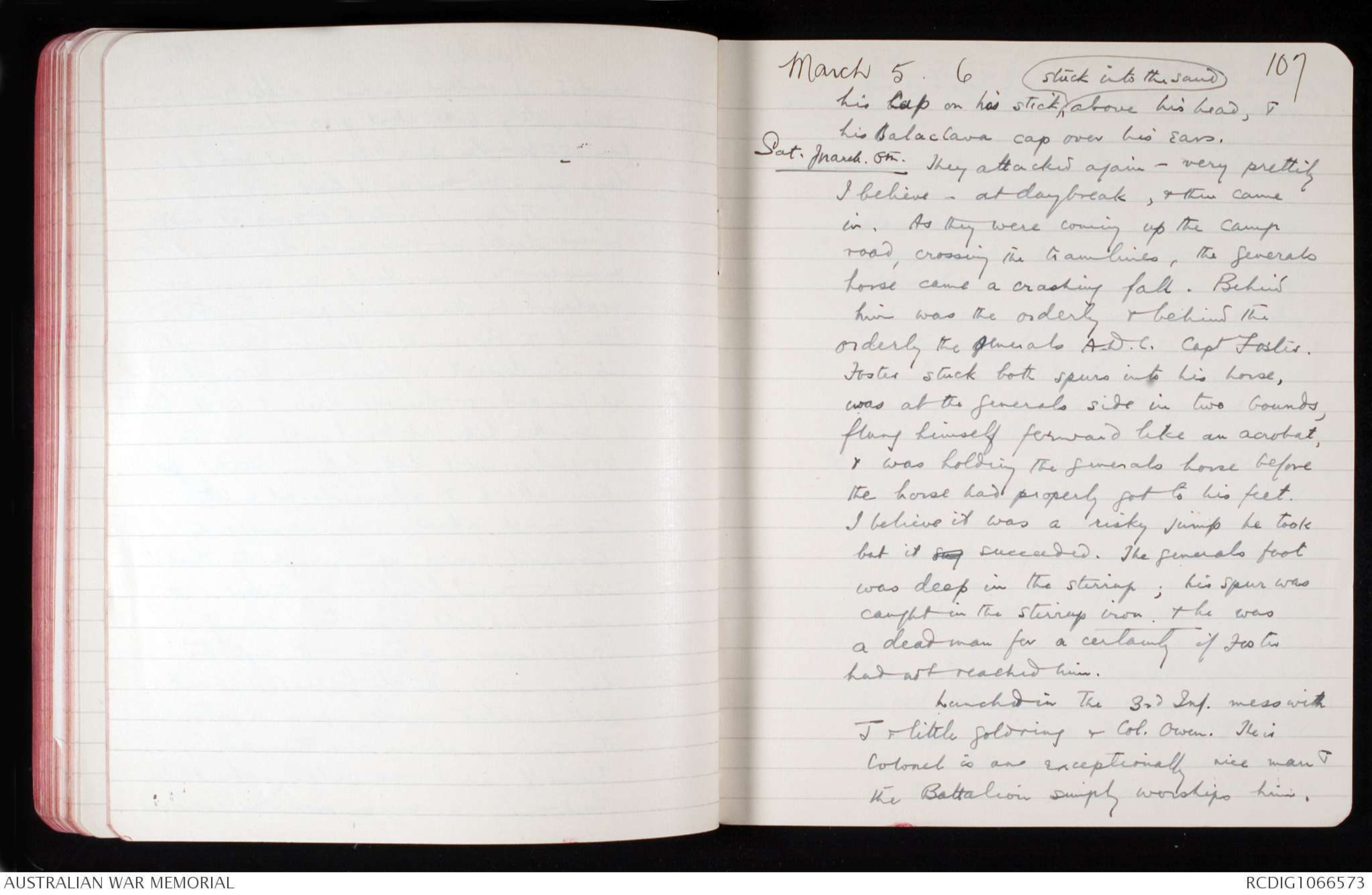
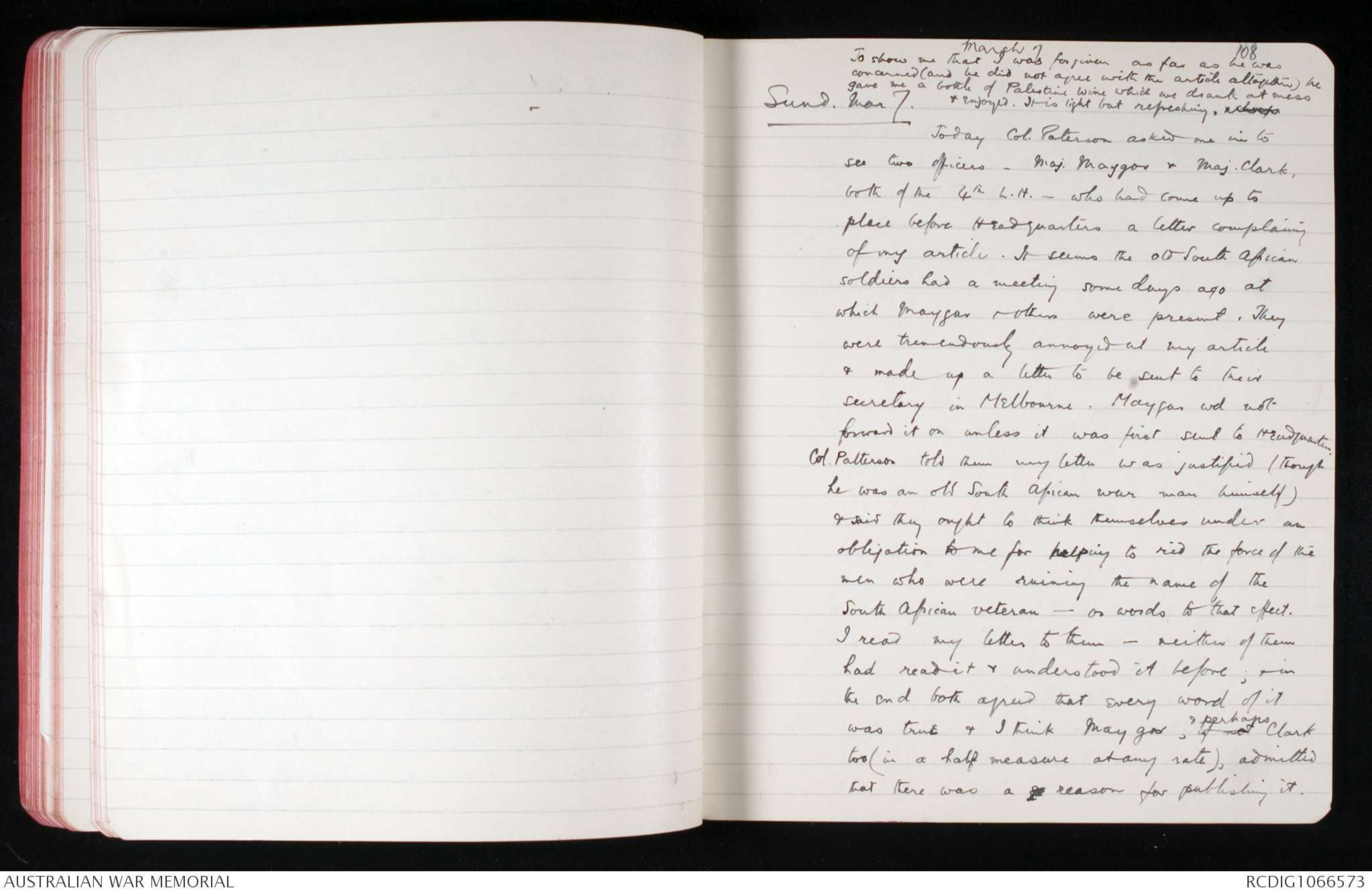
99
March 4
I go through the camp - "set of bally wasters"
(what I am supposed to have called them - of
course I didn't; but I don suppose they
misunderstand the word "leaven" of
wasters which I used referring to the
handful of chaps - now mostly sent back -
who were getting these chaps a bad name).
"Do you read the Argus?" & things a good deal
warmer, occasionally, than that. Now the
history of the article is as follows: It
was actually written because the General asked
me to write something to prepare the people
of Australia for the return of the men who
had been disgracing their country in Cairo &
bringing a bad name on the whole force. They
are mostly old soldiers, few many of them not born
in Australia at all & when one saw
what splendid ^ willing young chaps most of the
force was composed of one could not
help being angry at the way these old
hardheads were losing the whole of this
fine body of young Australians their good
name. I thought something ought to be written about it but didnt think they would
ever let anything through. One gets very ashamed of oneself crying continually that all is well when name. The General-first spoke to me about
as a matter of fact all is not well - It doesn't seem fair to the people of Australia. However Iit - He had received a letter from General
was preparing to write a lot of little pretty trivial stories when the General met me on the
stairs & stopped me. He said he had received a letter from General
100.
March 4
Birdwood, who had been spoken to by Gen.
Maxwell about the conduct of this
rowdy section of the Australian force.
The General said of course I was not to send
the letter itself; but he would show it to me &
I could write something about it to prepare
the Australian people ^ for the sending home of these rowdies. I asked if I should
do so by cable or letter, & he said he thought
both. I therefore cabled an extract from Sir
George Reid's speech about "The " if there
is any amongst you that is unworthy
etc. etc., they must be cast out" - & wrote
this 18th article carefully avoiding any
scare, understating the facts in every
direction, & being as far as I could,
scrupulously fair. ^ They simply don't know - Some of them don't believe they were getting a bad name. But I had heard the Australians
discussed in the Admirals cabin on the
Swiftsure, when there were about 20 distinguished
officers & others at lunch; Sir John Maxwell
asked me if they all drank quite so hard, &
when they were going to stop it; he said he
wd have to put the ^ hotel bars out of bounds
if they didn't stop it; every time one went
into Cairo the censors, the telegraph clerks,
101
March 4
the civilians in the hotels used to ask
me when the Australians were going to be
tied up & nearly always ^ often drew some comparison
between them & the New Zealanders & Territorials.
I always said it was only the act of a few
- & it seemed quite clear to me too that
something ought to be written about it in
order to see that it didn't happen with future contingents So I was glad when the General
& also to make sure that the old hard heads
who were sent home didn't go back &
turn round & pose as injured heroes &
start abusing ^ those officers & men who were
here really doing their work in a way
to bring credit on their country. The
article prevented that. And now, in
spite of the outcry in camp, the General
has not gone back upon his opinion. He
said the other day he thought it was
a good article except in one point -
that he it smaller to mention seemed to make out that
the Light Horse at Maadi were better
than the Mena men. Col. White saw my
point there - that the civilians at Maadi
had done more for the troops than the
102
March 4
people anywhere else & that had (as it
unquestionably did) its effect. "I think it
was a good thing it was written, Bean",
Col. White said, " it is a wholesome article;
it will do a lot of good".
And I think so too, although I don't
know that I'd have written it if I had thought any
Australian papers would twist it into scares
about their absent soldiers & that offe wives &
relations would so hopelessly misunderstand
what was so clearly written. I believe the
article has done & will do good - anyway
my job is to tell the people of Australia
the truth. When things go wrong - & they went looked like
going very wrong at Christmas time - my job is to
see that at any rate the blame is put on the
right people & that the innocent dont get a
bad name for what they didn't do. When
things go right I have to try & see that
the Australian people knows the right
people to get the credit. If they want
some one to feed them on soft pap, only
to tell them good & pleasant things whatever
happens, then I am not the man for the job.
103
March 4
I am not going to shift one little any part of
the responsibility for this article onto other
shoulders. I have told no one except Jack
(although some of the staff knew it before) that
the General asked me to write this article.
What I have done is (1) to try and correct the
scare article in The Sydney Sunday Times
(which I did not write) by a strong cable
to Australia; & (2) to show the men that if
I write about things when they go wrong I also
write & give them the full credit when things
go right. I have got the staff to publish
an extract from my article on the Division
in orders & also an extract of a cable
sent on Feb 26th. I have got Reuterscorres In order that it was anything
said in my article may not affect the
reputation of the force outside Australia, I
have got that Reuters correspondent here
to telegraph an immensely appreciative
(& to my mind perfectly true) summary
of the work of the A.I.F. here to every
paper in Great Britain. I know it has
104
March 4 / 5
had some effect in Australia because
we have had a telegram from the ^ Defence Minister
there (which has been published in orders)
congratulating the troops on the work
report. I have seen that this also
got into the Egyptian Mail.
I cant do more than that - &
there I leave it. I am not telling anyone
that the General asked me to write the
article because, for one thing, I approve of I wanted to write it & I believe it has it altogether done good; & secondly it would make
him unpopular & f it is far better
that I shd be unpopular than he.
I could apply to be attached to
the 2nd Divn - which doesnt feel the
same way - but I'm not going to.
The 1st Australian one is the one I've
been with & I'm not going to criticise
them and run away. I've no doubt the
2nd Divn has just as many troublesome
rowdies in it as we once had - perhaps
more.
March 5 Friday. Spent last night at Heliopolis
105
March 5
House Hotel as I wanted to see the New
Zealanders returned from the Canal, & to
get Col. Monash to let me have some particulars
of the composition of the second force. I saw a
divisional manoeuvre of theirs the other day -
something very fine spectacularly. I had come over
to see Col. Monash or MacGlynn & found they
had gone out ^ on a "scheme". It was then about 1 o'clock The clerks in the brigade
office didn't know if it was a divisional
or a brigade scheme - thought it was
a brigade one - out along the Suez Road. I
walked out in the direction indicated & after
about 2 hours hard going found the Divl.
Headquarters of Gen. Godley ^ on a steep solitary hill with the N.Z.
Mounted Rifles brigade dismounted in
rear of it - looking very fine. They
told me Col. Monash's Headquarters
were probably away on the left - so I
pushed on up a sandy wady & found
it about an hour later. The attack was
just finishing - an assault on a hill; &
I walked back to Heliopolis, had tea
there, drove halfway from Cairo to Mena
camp - &, as it was cold & the trains were
106
March 5
crowded I walked the last 5 miles from Giza
to camp getting back about 9.30 & having walked
from 25 to 30 miles since 11.30. That was a few
days ago - Wednesday, I think.
Today, I got back to Mena at midday
& we started at once on a divisional
manoeuvre, our first. The scheme was
explained by the General from Cairn Ridge
behind the Pyramids. Then we went out
into the desert & placed our H.Quarters
at Grey Hill & afterwds drew it back behind
a smaller hill at the back. The two
brigades were both late in starting for
their attack & afterwards got a little
too much ahead. Late at night the
transport came up through the desert
with the mens blankets and tucker. It
was a fine sight to see them coming -
eight horses in a team - through the
heavy sand. The old General slept out -
just curled himself up in a gutter in
the sand - I saw him there all by
himself as I was walking about. He
had only a rug on over his overcoat,
107
March 5. 6
his cap on his stick ^ stuck into the sand, above his head, &
his balaclava cap over his ears.
Sat. March 5th. They attacked again - very prettily
I believe - at daybreak, & then came
in. As they were coming up the Camp
road, crossing the tramlines, the Generals
horse came a crashing fall. Behind
him was the orderly & behind the
orderly the Generals A.D.C. Capt Foster.
Foster stuck both spurs into his horse,
was at the Generals side in two bounds,
flung himself forward like an acrobat,
& was holding the Generals horse before
the horse had properly got to his feet.
I believe it was a risky jump he took
but it xx succeeded. The Generals foot
was deep in the stirrup; his spur was
caught in the stirrup iron & he was
a dead man for a certainty if Foster
had not reached him.
Lunched in the 3rd Inf. mess with
J & little Goldring & Col. Owen. This
Colonel is an exceptionally nice man &
the Battalion simply worships him.
108
March 7
To show me that I was forgiven as far as he was
concerned (and he did not agree with the article altogether) he
gave me a bottle of Palestine wine which we drank at mess
& enjoyed. It is light but refreshing. & cheap.
Sund. Mar 7.
Today Col. Paterson asked me in to
see two officers - Maj. Maygar & Maj. Clark,
both of the 4th L.H. - who had come up to
place before Headquarters a letter complaining
of my article. It seems the old South African
soldiers had a meeting some days ago at
which Maygar & others were present. They
were tremendously annoyed at my article
& made up a letter to be sent to their
secretary in Melbourne. Maygar wd not
forward it on unless it was first sent to Headquarters.
Col. Patterson told them my letter was justified (though
he was an old South African war man himself)
& said they ought to think themselves under an
obligation to me for helping to rid the force of the
men who were ruining the name of the
South African veteran - or words to that effect.
I read my letter to them - neither of them
had read it & understood it before; & in
the end both agreed that every word of it
was true & I think Maygar, if not & perhaps Clark
too (in a half measure at any rate), admitted
that there was a go reason for publishing it.
 Loretta Corbett
Loretta CorbettThis transcription item is now locked to you for editing. To release the lock either Save your changes or Cancel.
This lock will be automatically released after 60 minutes of inactivity.